
UNDERSTANDING YOUR CHILD’S ASTHMA IS ONE OF THE MOST IMPORTANT PART OF HELPING THEM CONTROL THEIR ASTHMA1
Childhood asthma is the most-common chronic disease among children with more than 20% of Singaporean children being diagnosed by the age of 15 years.2,3 It can be difficult to know if your child has asthma as many children go symptom-free for a long time before having their first asthma attack.4
Children may not always show the same asthma symptoms as adults. If your child has one or more of these common symptoms, take them to see a doctor:4
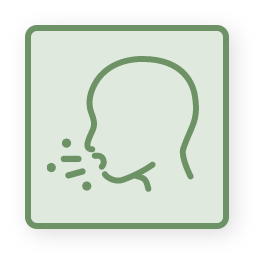
Coughing
Either constant, made worse by viral infections, when asleep, or triggered by exercise or cold air
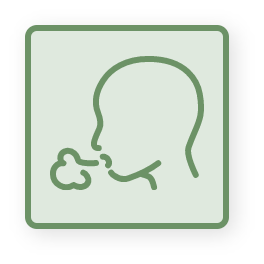
Wheezing or
whistling sound
When your child exhales
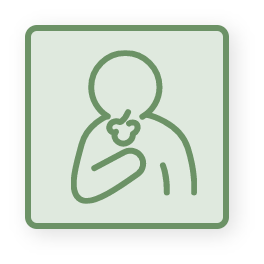
Shortness of breath
or rapid breathing
May be associated with exercise
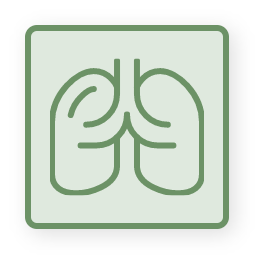
Chest tightness
Your child may say that their chest “hurts” or “feels funny”
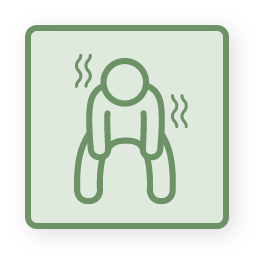
Fatigue
Your child slows down or stops playing
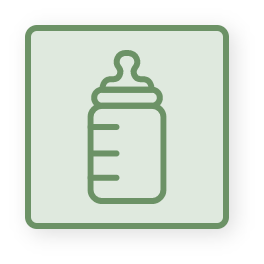
Problems feeding or grunting during feeding
For infants

Avoiding sports or social activities
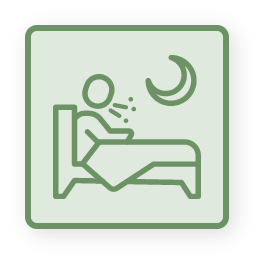
Problems sleeping
Due to coughing or difficulty breathing
HOW DO I EXPLAIN ASTHMA TO MY CHILD?

For young children
- Avoid medical terminology and use language appropriate for your child’s age
- Talk about basic information such as what triggers their symptoms
- Practice using a nebuliser, peak flow meter and spacer (if they use it) so that your child understands how each device works
- Create a routine so that your child becomes familiar with when to take their medication
- Consider using storybooks, games and puzzles to explain asthma

For adolescents and teens
- Explain what happens if your child does not take their medication every day to ensure they use their controller/preventer as prescribed
- Reassure your child that they can participate in almost all activities their friends do if they take their medication correctly
- Let them explore educational websites about asthma so that they can read about it at their own pace
HOW DO I HELP MY CHILD CONTROL THEIR ASTHMA?
1
1
Know your child’s asthma triggers1,6
- Your child may have one or many things that triggers their asthma
- Work with the doctor to identify your child’s asthma triggers so that you can take steps to remove them
- Discover simple tips for managing common asthma triggers
2
2
Be aware of your child’s warning signs of an asthma attack6
- Learn your child’s warning signs by thinking about the last time your child had an asthma attack
- These may include coughing at night, cold/flu, fever, stuffy/runny nose, tickle in the throat, sneezing and watery eyes
3
3
Make sure your child is using their asthma medication correctly1,6
- It’s important to know which, when and how to use your child’s medication, and be familiar with their Asthma Action Plan
- Learn more about treatment options and the Asthma Action Plan
4
4
Regularly check your child’s asthma control7,8
- Your child’s asthma can change over time, so you should consider taking the Childhood Asthma-Control Test (ages 4 to 11) or Asthma-Control Test (ages 12 and above) regularly to check if their asthma is well controlled and share the results with your doctor
5
5
Prepare for an emergency – inform your child’s caregivers5
- There may be situations when your child experiences asthma symptoms when you are not around
- Let your child’s teachers, coaches and/or babysitters know how to recognise your child’s asthma symptoms and give them a copy of your child’s Asthma Action Plan so they know what to do if they have an asthma attack
FREQUENTLY ASKED QUESTIONS
Most children will outgrow childhood asthma, but the reason why is unclear.9,10
Children with severe childhood asthma (i.e., uncontrolled) tend to have asthma persisting until adulthood more than those who only had mild asthma (i.e., well controlled).9–11 That’s why it’s so important to regularly check if your child’s asthma is well controlled and to work with your doctor so that your child is on the right treatment.
Yes, childhood asthma can come back later in life.10,12
One study has shown that childhood asthma came back in 44% of those aged 16–18 years in the Asian population – the most-common age group for childhood asthma relapse.12
There is no cure for asthma. However, most children and adults can successfully control asthma throughout life with proper treatment and an Asthma Action Plan.1,13
Your child should exercise as part of their daily activities when their asthma is controlled. Children with asthma can and do excel in athletics – in fact, many Olympic athletes have asthma.1
Share your child’s Asthma Action Plan with the school nurse, teachers or any coaches who look after your child at school. With your and your doctor’s approval, your child can take their inhalers with them to school.1,5
There are 4 simple steps you can take during an asthma attack:14
- Stay calm
- If your child has been given a reliever medication by your doctor, let your child use it for quick relief and repeat as advised by your doctor
- Keep your child comfortable by loosening clothing around their neck, get them to sit upright and let fresh air into the room
- Call your doctor or 995 immediately if your child has a severe asthma attack. Signs of a severe asthma attack include:
– Your child is unable to speak, struggles to breathe or gasps for air
– Your child experiences chest pain, palpitations and blue lips or fingertips
– Your child is not getting better with the reliever medication
- AAAAI. Childhood asthma, 2020. Available at: https://www.aaaai.org/Tools-for-the-Public/Conditions-Library/Asthma/Childhood-Asthma-TTR. Accessed December 2022.
- WHO. Asthma, 2022. Available at: https://www.who.int/news-room/fact-sheets/detail/asthma. Accessed December 2022.
- Tan C, et al. Singapore Med J. 2009;50(1):54–61.
- AAAAI. Childhood asthma, 2020. Available at: https://www.aaaai.org/Tools-for-the-Public/Conditions-Library/Asthma/Childhood-Asthma. Accessed December 2022.
- AAAAI. Teaching your child about asthma, 2020. Available at: https://www.aaaai.org/Tools-for-the-Public/Conditions-Library/Asthma/Teaching-Your-Child-About-Asthma. Accessed December 2022.
- CDC. Help your child gain control over asthma, 2004. Available at: https://www.epa.gov/sites/default/files/2013-08/documents/ll_asthma_brochure.pdf. Accessed December 2022.
- Majellano EC, et al. J Asthma Allergy. 2019;12:235–251.
- Bime C, et al. Curr Opin Pulm Med. 2012;18(1):48–56.
- Trivedi M & Denton E. Front Pediatr. 2019;7:256.
- Papadopoulos NG, et al. Allergy. 2012;67(8):976–997.
- GINA. Global strategy for asthma management and prevention, 2022. Available at: https://ginasthma.org/gina-reports/. Accessed December 2022.
- Wu TJ, et al. Respir Res. 2014;15(1):135.
- National Heart, Lung, and Blood Institute. What is asthma? 2022. Available at: https://www.nhlbi.nih.gov/health/asthma. Accessed December 2022.
- HealthHub. Asthma (common childhood illnesses), 2022. Available at: https://www.healthhub.sg/a-z/diseases-and-conditions/695/common-childhood-illnesses-asthma. Accessed December 2022.
GSK is not responsible for third-party website content.
NP-SG-ASU-WCNT-230004. May 2023.
